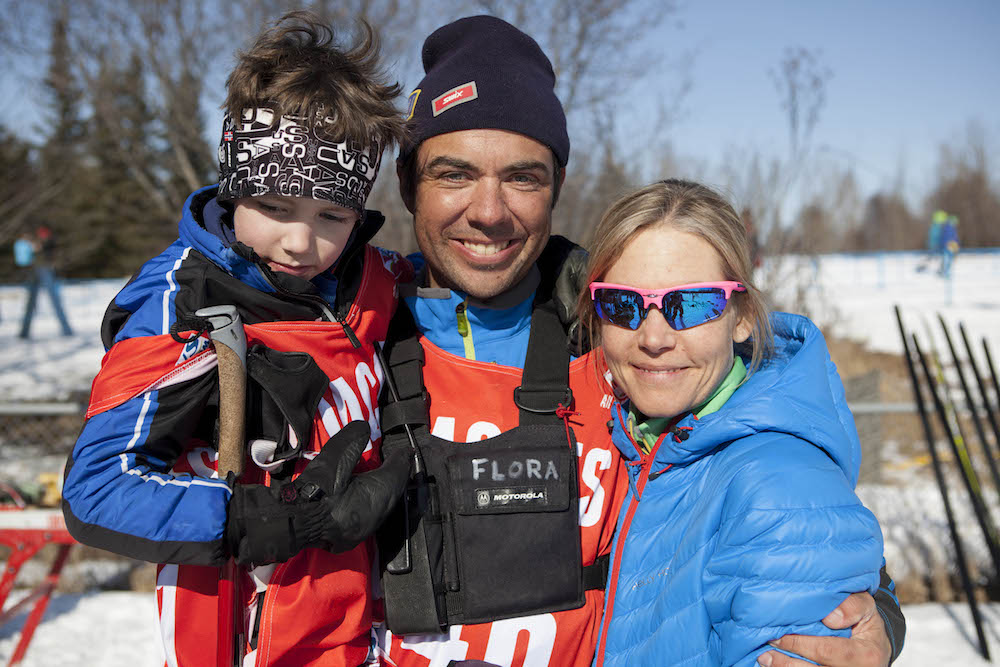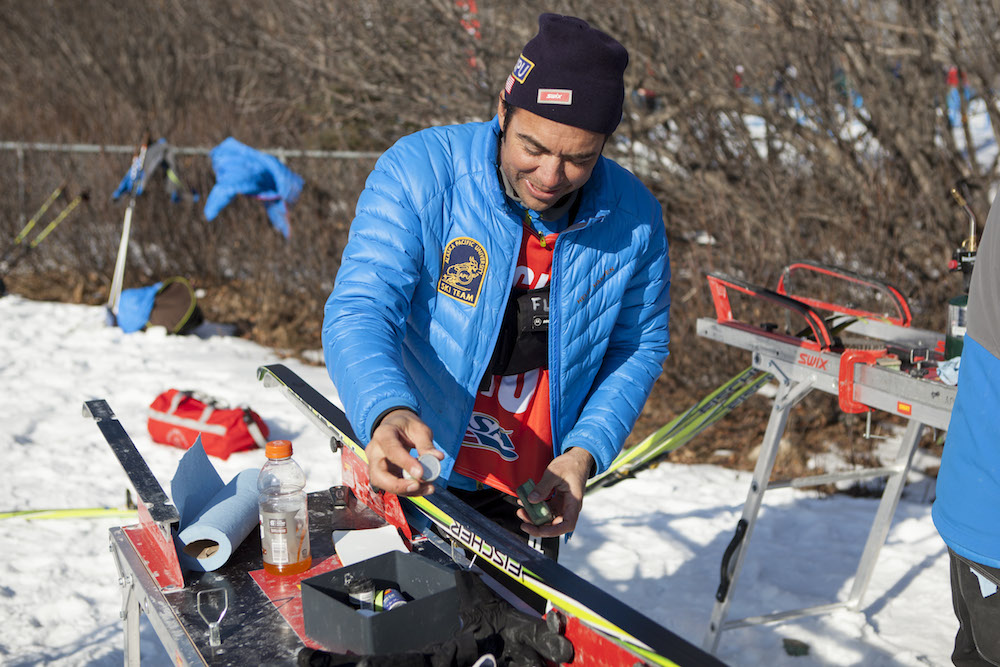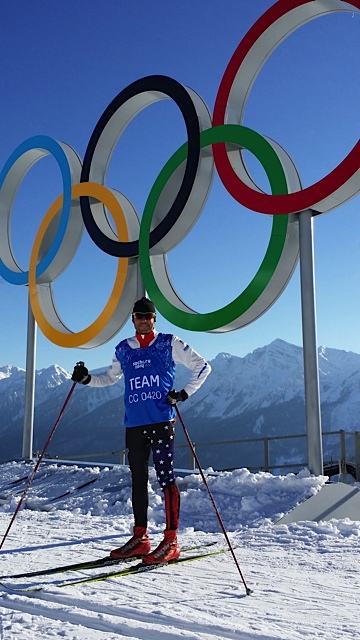
When Erik Flora checked his email late last month, he was on Eagle Glacier — about 6,000 feet straight up in the air from Girdwood, Alaska, and a helicopter ride away from mainstream civilization for 17 days with his Alaska Pacific University (APU) nordic team.
In his inbox sat a congratulatory email, much like the ones he had received from the U.S. Ski and Snowboard Association (USSA) in the past as multiple-time coach of the year. But this one was from the U.S. Olympic Committee, naming him National Coach of the Year — something no other cross-country coach had achieved before. In the award’s 18-year history, he was the fourth USSA coach to receive it.
The head coach of APU’s nordic team and director since 2006, Flora, 41, was dubbed the top coach of any of U.S. Olympic sport in 2013.
“I had no idea it was coming; it’s such an incredible honor,” Flora said on the phone after a morning rollerski session in Anchorage on Thursday.
This weekend, he’ll head back up to Eagle Glacier with the U.S. Ski Team women and the rest of the North American Women’s Training Alliance — about 14 select skiers.
“We’ve been working hard to build this program … and the coordination between helping athletes get to the next level,” he said. “It was really nice to get recognized for that.”
Years ago when Flora started with APU in 1998 as a masters coach and later a junior coach, he recalled working with a young and particularly promising skier, Kikkan Randall.
“I remember making a comment that I felt she could be one of the top skiers in the world in both distance and sprinting,” he said. “I remember a lot of people going, like, ‘Wow, that’s a big goal,’ but it’s funny because even as an athlete that’s what I saw. I saw it was totally possible to have World Cup medals in the U.S., I just felt the preparation wasn’t quite right.”
“I saw it was totally possible to have World Cup medals in the U.S., I just felt the preparation wasn’t quite right.” — Erik Flora
A former international competitor, Flora raced at Junior World Championships, U.S. nationals, and achieved NCAA All-American status. He won the Tour of Anchorage three times and notched Continental Cup top 10s, but didn’t quite reach what he considered to be his true potential.
That hunger, or desire, allows him to relate to his skiers — which he feels might be his biggest asset as a coach.

“My goal was to be an international-class skier and I didn’t necessarily reach my goals,” he explained. “I bring that experience of trying to be that U.S. skier trying to compete with the best in the world, but not maybe looking back and seeing all the places I could’ve worked and made that next step.”
That paired with his philosophy that nordic skiing is a team sport and that every hardworking athlete is in the “same boat” also makes the difference at APU, he said.
In Randall’s case, she went on to become the first U.S. female to win a World Cup gold medal, and claim a World Championships silver in 2009 and later gold in the 2013 World Championships team sprint. No other American has won an overall Sprint World Cup title, let alone three of them — in a row.
And Randall isn’t Flora’s only claim to fame. Four of the seven women on APU’s current elite team are either past or present U.S. Ski Team members; three of them (Randall, Sadie Bjornsen and Holly Brooks) competed at the 2014 Sochi Olympics.
Of the seven men on the team, two ranked first and second in the overall 2013/2014 SuperTour standings (Reese Hanneman and Erik Bjornsen). Lex Treinen was just outside the top three in fourth overall.
Looking at this year’s squad, which includes almost 20 additional training partners in town for the summer, Flora said the team’s depth as well as chemistry makes it one of his most exciting yet. Moreover, he considers himself to be more of a consultant than a coach, stepping back to let his athletes push and encourage one another.
“Both on the men’s and the women’s team you have this incredible team dynamic,” he said. “As far as a four-year [Olympic] outlook and where we are now, I just see this momentum as something that’s just getting rolling.”

At the last Olympics, Randall was widely considered a gold-medal favorite in the individual skate sprint. Having her and the rest of APU’s top-tier athletes around throughout the offseason elevates the quality of training sessions, Flora explained. By watching Randall, Brooks, or either of the Bjornsen siblings, aspiring skiers can see what it takes to reach their level.
“What people see is if they can do it, I can do it,” he said. “It kind of trickles through the group … to be out in the rain day after day … after a three-hour [workout] and knowing that you have to get up and do it all again the next day…” That’s what keeps them invested for the long haul.
“Maybe the most important thing that we’ve done is everyone on the team likes to train,” he added. “We want to be some of the world’s best skiers, this is what I think it’s going to take, let’s go give it a try. So everyone comes with all this enthusiasm and excitement.”
As an athlete in the 1990s, he remembers working just as hard, but training in smaller groups — nothing like the 40 to 50 skiers that were out rollerskiing at Kincaid on Thursday. For that reason, Flora said that he and others like him were probably 20 to 30 percent off the mark with their training.
“James Southam [a two-time U.S. Olympian, former APU skier and current USSA board member] and I were saying that this is what we always wanted as athletes,” Flora said. “It’s awesome. Man, if this was just here when I was younger — maybe that’s the best part about it is that it’s here.”
In the last eight years, Flora has seen his APU program rise to unprecedented success and become a U.S. nordic leader. He didn’t think it would come this quickly.
“It’s what I’ve always wanted to build,” he said.
While Flora wasn’t sure whether an official awards ceremony would follow the USOC recognition, Luke Bodensteiner, USSA’s executive vice president of athletics, explained in an email that Flora was first nominated by various sport committees within USSA.
From those choices, USSA selected its coach of the year — Flora — and nominated him for USOC coach of the year. The Olympic Committee then narrows each national governing body’s top pick down to three finalists, and finally, one award winner.
“I’ve long been impressed with Erik’s abilities as a coach, and proud of what he’s accomplished,” Bodensteiner wrote. “For him to be recognized in this way — as the best coach in U.S. Olympic sports — is an awesome statement about the quality of his coaching, his leadership and sense of urgency, and his commitment to performance.”
Bodensteiner added that the recognition is also a testament to cross-country skiing on the whole in the U.S., and the “high levels of accomplishment it’s been able to achieve.
“For a cross country coach to be a standout like this among all other Olympic sports shows that our coaches are working at a very high level of technical knowledge, detail and strong leadership,” he wrote. “And it validates the very strong work that the USSA’s community of coaches has done in the areas of athlete development and performance, education, and collaboration.”
U.S. Ski Team Head Coach Chris Grover noted that Flora was “very deserving” of the award for his hard work in bringing APU to its current standard, which he considered instrumental in the U.S. development pipeline.
“We made a strong bid within USSA to have Erik nominated as the USSA Coach of the Year, and he went up against some very accomplished candidates from the other skiing and snowboarding disciplines,” Grover explained. “Once the nomination arrived at the USOC, our testimonials and the results of the APU athletes did the talking.”
Flora is currently in the thick of APU’s preparation season after starting 21 consecutive days of camp earlier this week. The U.S. men’s team arrives on Monday and will start with dryland in Anchorage while the women finish up their on-snow camp on the glacier.
“I got this incredible award, at the same time we’ve got our head down and preparing,” he said.
And while it hasn’t completely set in, “I’ve enjoyed it,” Flora added.
Alex Kochon
Alex Kochon (alexkochon@gmail.com) is a former FasterSkier editor and roving reporter who never really lost touch with the nordic scene. A freelance writer, editor, and outdoor-loving mom of two, she lives in northeastern New York and enjoys adventuring in the Adirondacks. She shares her passion for sports and recreation as the co-founder of "Ride On! Mountain Bike Trail Guide" and a sales and content contributor at Curated.com. When she's not skiing or chasing her kids around, Alex assists authors as a production and marketing coordinator for iPub Global Connection.




One comment
gkentch
July 11, 2014 at 6:50 pm
Erik is a mensch.